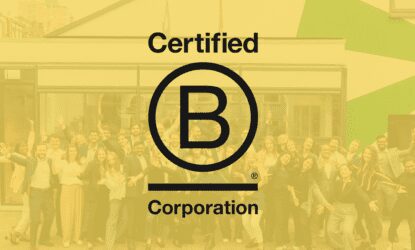 Behind the scenes: Nexio Projects’ journey through B Corp recertification
Behind the scenes: Nexio Projects’ journey through B Corp recertification
Why B Lab changed the standards
On 8 April 2025, B Lab launched the sixth—and most significant—iteration of the B Corp standards. This overhaul responds to growing regulatory demands, especially the EU’s Empowering Consumers for the Green Transition (ECGT) directive, and addresses criticism that the previous self-assessment and points-based model was too flexible and not rigorous enough for today’s sustainability landscape.
The new standards are designed to:
- Ensure compliance with evolving regulations (like the ECGT directive)
- Provide a clear, credible pathway for businesses to demonstrate genuine impact
- Eliminate loopholes that allowed companies to offset weaknesses in one area with strengths in another
What has changed: From points to progress
Phased certification and continuous improvement
The old system required companies to score 80 points on the B Impact Assessment (BIA). Under the new model, there are no points. Instead, companies must meet a set of “Year 0” sub-requirements to achieve certification, then progress to additional requirements in Year 3 and Year 5. Ongoing improvements are mandatory—no more “set-and-forget” recertification.
What this means: Businesses must now create multi-year roadmaps, focusing on continuous, measurable progress rather than ticking boxes for a one-off score.
Deadlines and transition paths
- SMEs recertifying in 2025 must submit under the old standards (version 6) by 30 June 2025.
- SMEs recertifying in 2026 get a 12-month extension, but must transition to the new standards.
- EU B2C companies should align with the ECGT directive by September 2026—old certifications won’t comply.
- Large enterprises must recertify under the new standards after January 2026.
What this means: Delaying transition could jeopardise market access, especially in the EU, where regulatory compliance is now non-negotiable.
Third-party certification
All B Corp assessments will now be handled externally to meet EU greenwashing regulations. This shift increases rigour and credibility, but may also mean longer timelines and more scrutiny.
What this means: External verification ensures greater trust in B Corp certification, but businesses should prepare for a more thorough review process.
Mandatory impact topics: no more cherry-picking Companies must now meet standards across seven non-negotiable impact topics, rather than choosing high-scoring areas to offset weaker ones.
The seven new B Lab impact areas in detail
1. Purpose & Stakeholder governance
Companies must act in accordance with a defined purpose and embed stakeholder governance in decision-making. This means aligning the company’s mission with positive social and environmental impact, creating governance structures to monitor social and environmental performance, and ensuring that oversight of purpose and sustainable business practices sits at the highest level. Regular stakeholder engagement and transparent communication about progress are required, moving away from shareholder primacy and towards accountability to all stakeholders—including workers, customers, communities, the environment, and shareholders.
2. Fair work
Fair work requires companies to provide good quality jobs, ensure fair wages, and foster a positive workplace culture. This includes implementing fair wage practices, incorporating worker feedback into decision-making, and supporting employee well-being. Companies must also ensure that all workers experience dignity, respect, and opportunities for growth.
3. Justice, Equity, Diversity & Inclusion (JEDI)
B Corps must build diverse and inclusive cultures, both within their workplaces and throughout their value chains. This involves fostering equitable communities, supporting underrepresented groups, and ensuring that diversity and inclusion are embedded in recruitment, retention, and advancement practices. Companies are expected to contribute meaningfully to just and equitable communities.
4. Human rights
Companies are required to respect human rights by identifying and addressing risks across their operations and value chains. This includes conducting human rights due diligence, preventing and mitigating negative impacts, and treating all people with dignity and respect. The standards demand proactive management of human rights issues, not just compliance with minimum legal requirements.
5. Climate action
B Corps must take concrete steps to combat the climate crisis, including developing action plans to limit global warming to 1.5°C. Larger companies are expected to include greenhouse gas emissions reporting and set validated science-based targets. The focus is on measurable action to reduce climate impact and support the global transition to a low-carbon economy.
6. Environmental stewardship & circularity
Companies must assess and minimise their environmental impacts, contribute to the circular economy, and pursue positive environmental outcomes. This means reducing negative impacts to stay within ecological thresholds, managing resources responsibly, and actively seeking ways to regenerate natural systems. The standards encourage innovation in circular business models and responsible product and service design.
7. Government affairs & collective action
B Corps are expected to use their influence to drive systemic change, engage in advocacy for positive social and environmental outcomes, and participate in collective efforts for impact. For the largest companies, this includes publicly sharing country-by-country tax reports to promote transparency and accountability. The aim is to foster shared understanding and implement solutions towards an equitable, inclusive, and regenerative economy.
What does this mean for your business?
The new standards raise the bar for everyone. Compliance is no longer about passing a points threshold but about demonstrating real, sustained impact in all critical areas. This approach rewards true leaders and ensures B Corp certification remains a mark of genuine, future-proof sustainability.
How Nexio Projects can help
As a certified B Corp since 2018, Nexio Projects has guided over 400 clients through the certification process. Our team of accredited B Leaders can help you:
- Assess your current readiness for the new standards
- Develop multi-year roadmaps for phased compliance
- Prepare documentation and evidence for third-party verification
- Embed sustainability into your strategy, governance, and culture
- Stay ahead of regulatory changes and market expectations
Next steps
Don’t leave your certification to chance. If you are wondering how to become a B Corp, we are here to help you start.
If you are not sure about your B corp recertification steps, take our short survey to see where you stand!

Why become a B Corp—and why work with us?
As a Certified B Corporation since 2019 and an official B Corp Way partner, Nexio Projects offers experienced guidance throughout your certification journey.
Our credentials:
• In-house team of trained B Leaders
• Certified B Corp and EcoVadis strategic partner
• 1,000+ projects delivered across 20+ countries
• Recognised by Verdantix among the world’s top boutique ESG consultancies
Whether you are exploring certification or seeking recertification, we help embed purpose into every part of your business as a force for good.
If you are looking to get regular updates about B Corp standards, as well as highlights from our collaborations with other B Corps, sign up to our newsletter!
Ready to future-proof your certification? Join the movement and get in touch with Nexio Projects to start your B Corp journey or transition to the new standards.
References
B Lab (2025a) B Lab publishes new B Corp standards, raising the bar for businesses worldwide. Available at: https://www.bcorporation.net/en-us/news/press/b-lab-publishes-new-b-corp-standards-raising-the-bar-for-businesses-worldwide/ (Accessed: 23 April 2025).
B Lab (2025b) Explore B Lab’s new standards. Available at: https://www.bcorporation.net/en-us/standards/performance-requirements/ (Accessed: 23 April 2025).
B Lab (2025c) Frequently Asked Questions – Certifying on B Lab’s New Standards. Available at: https://kb.bimpactassessment.net/en/support/solutions/articles/43000753428-frequently-asked-questions-certifying-on-b-lab-s-new-standards (Accessed: 23 April 2025).
B Lab (2025d) B Lab’s New Standards Impact Topic: Purpose & Stakeholder Governance. Available at: https://www.bcorporation.net/en-us/news/blog/b-lab-new-standards-impact-topic-purpose-stakeholder-governance/ (Accessed: 23 April 2025).
B Lab (2025e) B Lab’s New Standards Impact Topic: Fair Work. Available at: https://www.bcorporation.net/en-us/news/blog/b-lab-new-standards-impact-topic-government-fair-work/ (Accessed: 23 April 2025).
B Lab (2025f) B Lab’s New Standards Impact Topic: Environmental Stewardship & Circularity. Available at: https://www.bcorporation.net/en-us/news/blog/b-lab-new-standards-impact-topic-environmental-stewardship-circularity/ (Accessed: 23 April 2025).
B Lab (2025g) Guidance for all B Corps due to recertify in 2025/2026. Available at: https://kb.bimpactassessment.net/en/support/solutions/articles/43000753161-guidance-for-all-b-corps-due-to-recertify-in-2025-2026 (Accessed: 23 April 2025).
B Lab (2025h) Achieving the new standards through continuous improvement. Available at: https://kb.bimpactassessment.net/en/support/solutions/articles/43000747441-a-three-year-certification-cycle (Accessed: 23 April 2025).











